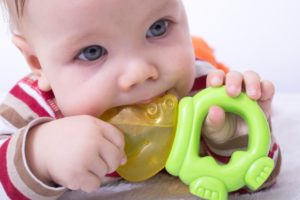 Most recently and most importantly, a meta-analysis of all available evidence looked at the following three case studies (among others) and concluded that some mild symptoms like drooling, gum irritation, and mild irritability are seen more commonly in children who are teething. They also noted a slight increase in body temperature, but nothing that would be considered a fever.
Most recently and most importantly, a meta-analysis of all available evidence looked at the following three case studies (among others) and concluded that some mild symptoms like drooling, gum irritation, and mild irritability are seen more commonly in children who are teething. They also noted a slight increase in body temperature, but nothing that would be considered a fever.
Essentially, if a baby has a fever, a temperature greater than 100.4F, rash, diarrhea, or if he seems particularly irritable, it is probably totally unrelated to teething, although it could be indirectly related because he is exposed to more germs by putting his hand or other objects into his mouth because his teeth hurt.
- In Pediatrics, the article “Symptoms Associated With Infant Teething: A Prospective Study” showed that symptoms of decreased appetite for solid foods, biting, drooling, ear rubbing, gum rubbing, irritability, rash on face, sucking, abnormal temperature, and wakefulness were found to have some association with the teething process. It is worth noting the abnormal temperature was a slight increase in the child’s personal average temperature- not necessarily a fever.
- In Pediatrics, the article “Teething and Tooth Eruption in Infants: A Cohort Study” states that this study did not confirm that tooth eruption in infants and toddlers is associated with fever, mood disturbance, an appearance of illness, sleep disturbance, drooling diarrhea, strong urine, red cheeks, or rashes on the face or body.
- In Pediatrics, the article “Prospective longitudinal study of signs and symptoms associated with primary tooth eruption” reported that results of their study reveal a greater frequency of sleep disturbance, increased salivation, rash, runny nose, diarrhea, loss of appetite, and irritability. They did not find fever to be a symptom of teething.
Teething Treatments
What about common treatments for teething used today? Do they work? Are they safe?
- Amber Necklaces– Amber teething beads work on a simple theory of mild magnetism, which has been found to have the potential to reduce mild pain, such as accompanies teething. However, many promoters do suggest a plausible mechanism. They claim that amber contains an analgesic substance called succinic acid which is released by the beads in response to the warmth of the child’s body and absorbed through the skin. Regarding safety, they present a very real danger of strangulation or choking, both of which are worse than teething symptoms.
- Topical Teething Gels ( Orajel, etc) These have a numbing effect and may provide some pain relief and actually help. However most of them contain benzocaine, a medication that can cause a fatal condition called methemoglobinemia in rare cases. They are widely available but because of the safety risk are not recommended.
- Acetaminophen, Tylenol, Ibuprofen, Motrin or Advil – These medicines help with fevers and pain and they may help to relieve some mild discomfort caused by teething. They have been proven safe at the recommended dosages. Do not use acetaminophen under 2 months or ibuprofen under 6 months unless directed by your doctor.
- Cold Objects – These are both effective and safe. Teething toys and washcloths can be placed in the refrigerator, to provide some relief with very little risk or harm.
- Teething toys – These provide a benefit with very little risk. Choose toys designed for this purpose. If nothing is available, most babies seem fine with using their hand or feet.
Research has pointed out that teething begins around six months of age. This is the same time when an infant’s immunities received from their mother, via the placenta, are demising. This means that the infant’s own immune system is becoming established. During this time, infants become vulnerable to minor infection. Because these two changes are taking place, the symptoms of teething can be confused with a minor illness or cold and vice versa. Probably the most important thing parents can realize about teething is that despite what your grandmother told you, teething doesn’t cause severe symptoms. But no matter what’s causing the fever, fussiness, or rash, the symptoms are real. If you have any question about your child’s health be sure to ask your pediatrician – it is what they do!!!
Contact Us (859-525-8181) if you have any questions!
—
 About Pediatrics of Florence
About Pediatrics of Florence
We believe that children are more than just “little adults.” They have unique personalities, challenges, and life circumstances and we have made every effort to make our offices and care as “kid friendly” as possible. We have an aquatic theme in the waiting rooms (separated for sick and well children) as well as themed examination rooms. All of our physicians are Board Certified Pediatricians and members of the American Academy of Pediatrics and our nurse practitioners are all licensed Pediatric Nurse Practitioners and are available to see both well and sick children.
>> Learn More About Pediatrics of Florence
